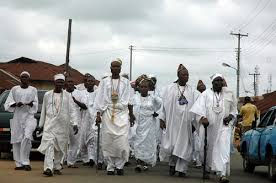More Than Priests: Understanding the Sacred Government of Ifá
- ifakolade
- Aug 21
- 4 min read

When many people think of a spiritual path, they might imagine a loose collection of
practitioners and followers. But to truly understand Ifá, one must see it not just as
a religion or a divination system, but as a complete and sophisticated framework for
cosmic and social governance, handed down from time immemorial. At the heart of this
framework is a structured spiritual council, a cabinet of wisdom keepers whose titles
and roles ensure the integrity, preservation, and proper application of divine law.
This council, most famously codified in the spiritual capital of Ilé-Ifẹ̀, is a
testament to the organizational genius of our ancestors. Let's explore some of these
sacred titles to appreciate the depth of the system we are all a part of.
The Pinnacle of Leadership: The Head of the Council
At the very top of the Ifá spiritual hierarchy are roles of immense responsibility,
akin to the highest leadership positions in any global institution.
* Àràbà: The highest of all titles, meaning "The Great Ceiba Tree." Just as the ceiba
tree is ancient and its massive canopy shelters all who come under it, the Àràbà is
the ultimate spiritual father for a major region, or in the case of the Àràbà
Agbáyé, for the entire world. He is the final authority on the most profound
spiritual matters.
* Olúwo: Meaning "Lord of the Secrets," the Olúwo is the chief priest and
administrator of a local Ifá community, temple, or lineage. He is the leader who
presides over the day-to-day spiritual life of his community, from initiations to
counseling and teaching. He is the primary shepherd for his flock.
The Pillars of Knowledge: The Keepers of the Path
For a tradition to survive, its knowledge must be passed down with perfect precision.
The role of the teacher is therefore one of the most sacred.
* Ojùgbọ̀nà: Translated as "The Eye on the Path," this chief is second-in-command to
the Olúwo. His sacred duty is to be the master instructor, overseeing the rigorous
training of every new priest. He ensures the sacred Odù verses, rituals, and laws
are transmitted without error. If the Olúwo is the king, the Ojùgbọ̀nà is his Chief
Justice and the Dean of the Academy.
The Foundation: The First Disciples of Ọ̀rúnmìlà
Two key titles in the council are not just roles but living monuments to the first
disciples who helped Ọ̀rúnmìlà spread Ifá throughout the world.
* Akọ́dá: "The First to Create/Teach." This title represents the sacred act of teaching
Ifá and disseminating its wisdom to the world.
* Aṣẹ̀dá: "The Creator's Authority." This title represents the application of that
wisdom—establishing Ifá's principles and creating order in society. Together, they
symbolize the essential duality of knowing and doing.
The Sacred Cabinet: A Council of Balance and Expertise
Like any functional government, the Ifá council is a body of expert advisors,
structured on the Yoruba principle of balance.
* Òtún Awó (The Right-Hand Priest) & Òsì Awó (The Left-Hand Priest): These are the
senior advisors to the Olúwo, representing the two sides of his council. They provide
the balance of perspectives necessary for wise governance.
* Balógun Awó (The Warlord of the Priests): This is not a military chief, but a
spiritual one. The Balógun is the master of spiritual defense, using his deep
knowledge of ritual and akose (Ifá medicine) to protect the community from negative
forces, illness, and misfortune.
* Agbọ̀ngbọ̀n (The Wise Elder): This title is reserved for a priest of profound wisdom,
eloquence, and historical knowledge. He is a living library, a consultant sought for
his deep understanding of Ifá's most complex and esoteric aspects.
The Divine Alliance: The Bond Between Priesthood and Royalty
Crucially, the world of Ifá is not separate from the world of civic leadership. The
council works in sacred partnership with traditional rulers, a bond reflected in the
Ifá liturgy itself. When we pay homage (ìjúbà), we often call the names of ancient
kings who were among Ọ̀rúnmìlà's first and most devoted followers: the Alárá of Àrà,
the Ajérò of Ìjerò, and the Òwáràngún of Ìlá. This reminds us that the king's crown
(adé) provides worldly order, while the priest's wisdom (awó) provides the spiritual
guidance to make that order just and sustainable.
At Ifá Temple Chicago, we are proud heirs to this intricate and profound legacy. The
structure of our tradition teaches us that leadership is a sacred trust, that
knowledge requires discipline, and that a community thrives when it is guided by a
balanced, wise, and functional council.
Aṣẹ.




Comments